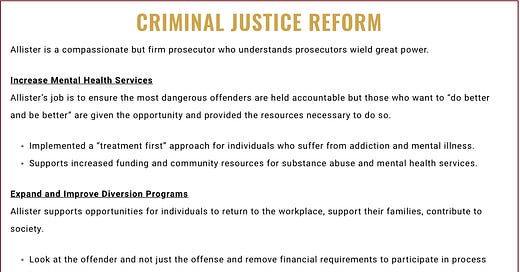Defense attorneys saw hypocrisy in County Attorney Adel's statements about rehab. And a new legal strategy.
Maricopa County Attorney Allister Adel spent a few weeks in treatment for alcohol use, and defense attorneys plan to bring it up in court to defend their clients.
When Maricopa County Attorney Allister Adel announced she was in rehab for alcohol use and anxiety, she asked for patience and understanding from the public.
Defense attorneys who represent people with substance use issues and mental health problems say Adel wanting grace was ironic: Their clients were afforded very little grace by Adel’s office.
And they saw a new legal strategy that could potentially help their clients.
Some are already bringing up Adel’s time in treatment in cases where they’re facing the Maricopa County Attorney’s Office, drawing comparisons to how Adel was treated and how they want their clients to be treated by Adel’s office.
“I've already brought it up,” Armando Nava, a criminal defense attorney in Phoenix, said. “There’s already been cases where I think it's more than relevant.”
While there’s a clear nexus in cases involving substance abuse or mental health, Nava said the strategy can apply in all cases — people make mistakes, and they shouldn’t be judged by their worst ones.
It’s not clear how the office will respond when defense attorneys bring up their boss’ time in rehab or whether the strategy will be successful. But the new strategy shows that, while Adel’s time in rehab may have ended (she returned to work this week), the issue isn’t put to rest.
The defense attorneys we talked to made clear they believe people seeking treatment should be afforded understanding.
But Adel is among the most powerful people in one of the United States’ largest counties. Her office decides whether people struggling with addiction problems are charged with crimes or cleared, whether people who have committed crimes pay for it with a year in prison or 10 years.
If Adel wants understanding and forgiveness from the public for her addiction problem, they argue that ordinary people charged with a crime — especially a crime stemming from addiction or mental health issues — should be awarded that same consideration from her office.

Katie Gipson McLean, a public defender, said some of her coworkers intend to bring up Adel’s recent stay in rehab and plea for understanding in their cases. They’re already sharing potential arguments, articles and statements made by Adel with one another, she said.
Gipson McLean isn’t sure if she’ll raise the issue herself when representing clients: It depends on the case, the client, the prosecutor. In some instances, it may backfire. She wouldn’t want it to be perceived as playing a political game. If it won’t benefit a client, she won’t use it. But if there’s a case where it makes sense, she will.
“I would definitely be careful because I don't ever want something that seems political to negatively impact my client in any way,” she said.
To support our original reporting, you can sign up below to receive our emails in your inbox. If you like what you’re reading, you can pay $7 per month to help us stay in business.
Adel had designs to change the office
Adel came into office with a platform that included increased services for mental health and expanded diversion programs. She called for a “treatment first” approach, where people receive care for substance abuse and mental illness before serving time.
The office has a long history of prosecuting drug crimes to the fullest extent of the law, and even mocked people with mental health problems under her predecessor. Adel pledged a more humane, compassionate office.
But much of Adel’s time as county attorney has been marked by her health issues — and the lack of transparency around them — and scandals over her office’s plans to charge protesters as gang members. Her short tenure has been most notable for her absences.
On Oct. 25, 2020, she fell and had to be taken to the hospital. She said alcohol wasn’t a factor in the fall, but she didn’t disclose it until more than a week later, when she needed emergency brain surgery on election night 2020.
She was in the hospital for two months after the initial surgery and received another brain surgery after, she told 12 News. She returned to the office in early 2021.
Then, earlier this month, she revealed she was in rehab for alcohol use, anxiety and an eating disorder. She only disclosed this publicly nearly two weeks after she started treatment and after Maricopa County Sheriff Paul Penzone told her he would tell the Maricopa County Board of Supervisors if she didn’t.
Adel came into office with a platform that included increased services for mental health and expanded diversion programs. She called for a “treatment first” approach, where people receive care for substance abuse and mental illness before serving time.
On its website, MCAO says Adel believes prosecutors need to “look at an offender and not just the offense” and address underlying substance use or mental health issues. The deputy county attorney evaluates cases and people that could be eligible for diversion programs.
Adel was appointed to the office following the nearly decade-long tenure of Bill Montgomery, a tough-on-crime prosecutor who was appointed to the Arizona Supreme Court.
Adel provided a statement saying treatment first is a priority, but it doesn’t mean treatment only. She did not address the broader strategies defense attorneys plan to use regarding her time in rehab.
“People who want to do better and be better should be given the opportunity to do so. This must be balanced with the role of this office to hold individuals accountable when they break the law,” Adel said in the statement.
But defense attorneys say her office hasn’t made much headway toward eliminating the to-the-fullest-extent-of-the-law culture that permeated his office.
Jared Keenan, senior staff attorney with the ACLU of Arizona, said he would love to see the treatment-first approach that Adel boasts of. Instead, he sees drug offenders often facing a “prison-first” prosecution strategy.
“There are many people on a daily basis who very much are in need of treatment, compassion, and are not getting that from the prosecutors at MCAO,” Keenan said. “Instead of allowing people who have some substance abuse issues to get drug treatment, they are instead sending people to prison, for some people for a very long period of time.”
Defense attorneys say MCAO’s “treatment first” approach often applies narrowly, mostly in drug-offense cases. Oftentimes, drug users deal or share to afford their habits, and those cases should be treated as addiction cases, rather than drug-dealing cases, he argued. Same for other attempts to support a drug habit — people who commit burglary or shoplifting who have underlying substance use issues often don’t receive this treatment-first approach.
“If you look at the underlying reason why these people have engaged in this activity, it is generally tied in with their own substance abuse issues,” Keenan said.
People with substance abuse and mental health disorders need more access to services in the community so that treatment can come before someone gets wrapped into the criminal justice system, Adel said.
“Treatment first has been written into MCAO plea policies and is at the core of the Felony Diversion Program started under my administration, but every case and every defendant is different. There are different criminal backgrounds, charges and circumstances and each of these must be considered in each case,” Adel said in a statement.
More than 900 people facing felony charges last year had their cases dismissed after completing treatment programs. Since the new program began, diversion offers were made in more than 5,200 cases, she said.
But the office’s problems go deeper than not offering enough diversion courses, Keenan said. MCAO punishes people who exercise their rights to a preliminary hearing or who reject plea offers in favor of trials, warning that the next plea offer will get “presumptively harsher” or even “substantially harsher,” in what the ACLU called a “retaliation policy” in a recent court filing. In many cases, people are pushed into unfair deals before the prosecutors have even reviewed, let alone disclosed, the evidence against them, with the threat that if they don’t take that plea, prosecutors will only go after them harder.
One attorney we spoke to, who talked on background for fear of retribution, said they have seen very little grace extended by MCAO to people with substance abuse or mental health issues.
“People aren't even given first chances in a lot of scenarios, not to mention second chances,” they said.

Where and how defense attorneys will use the strategy
Most of the conversations that include these arguments would happen outside the public eye, in conversations with prosecutors while negotiating, Gipson McLean said. A judge isn’t responsible for MCAO policy, and they’re bound by the parameters of a plea or sentencing laws.
Keenan said MCAO routinely creates pleas that stipulate strict sentences and even judges who think the deal is excessively harsh has little say. Judges can either accept or reject a plea deal, but that’s about it, he said.
“And if they accept, then they have to sentence according to the terms dictated by the prosecutor in the plea deal. … Even when judges think a particular plea deal is excessively harsh, they often are loath to reject a plea deal because they realize it’s possible the person will get something even worse at the trial.”
While judges’ hands are often tied when it comes to sentencing, prosecutors have more leeway in what they charge, he said, and could not charge people based on their prior convictions if they so choose. Keenan said he would hope that given Adel’s request for patience in her own circumstance, her prosecutors would look at the tools that are available to them to provide leniency for defendants, but he doesn’t have much faith that will happen.
“People who have lots of felony convictions for possession cases and stuff like that are likely the very people who need additional treatment,” Keenan said. “A prosecutor could in theory use their discretion to allow for probation and treatment in cases like that. But from my experience and from the experience of most of the defense attorneys I know, that just doesn't happen and certainly doesn't happen with prosecutors at MCAO.”
The strategy of bringing up Adel’s own struggles with mental health and substance abuse could come up in public at settlement conferences or in sentencing memos as well.
“I think it has more pull when you're bringing it up directly to the people who are working under this person,” Gipson McLean said.
Nava saw a clear hypocrisy in the situation — the county attorney seeking treatment, and patience from the public while doing so, while her office prosecutes people whose crimes often stem from similar issues.
He said this will be part of his strategy moving forward, something he will continue to “harp on for the foreseeable future” in his cases.
“We'd like a little bit more understanding for our clients if we're being asked to give that to one of the most powerful people in the county,” he said.
Let your friends and colleagues know about this story and the Arizona Agenda!





